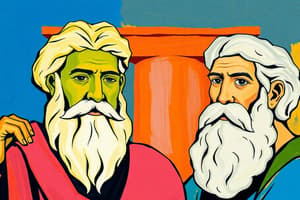Podcast
Questions and Answers
According to Socrates, what is the value of examining one's life?
According to Socrates, what is the value of examining one's life?
- To be content with the simple things in life
- To embrace adversity
- To strive for wisdom and perfection (correct)
- To find pleasure in life
According to Plato, what are the three parts of the soul/self?
According to Plato, what are the three parts of the soul/self?
- Apathy, pleasure, simplicity
- Wisdom, perfection, balance
- Reason, Physical appetite, spirit/passion (correct)
- Matter, form, completion
According to Aristotle, how does the self/mind develop?
According to Aristotle, how does the self/mind develop?
- Through maximizing pleasure and minimizing pain
- Through being content with the simple things in life
- Through experiences (correct)
- Through embracing adversity
Which philosophical perspective advocates for embracing adversity and indifference to pleasure?
Which philosophical perspective advocates for embracing adversity and indifference to pleasure?
Which philosophical perspective believes that pleasure is the only good in life and our goal should be to maximize pleasure and minimize pain?
Which philosophical perspective believes that pleasure is the only good in life and our goal should be to maximize pleasure and minimize pain?
According to the Ancient Triumvirate, which philosopher believed that the soul strives for wisdom and perfection?
According to the Ancient Triumvirate, which philosopher believed that the soul strives for wisdom and perfection?
According to Plato, which part of the soul/self is associated with physical appetite?
According to Plato, which part of the soul/self is associated with physical appetite?
According to Aristotle, how is the self/mind developed?
According to Aristotle, how is the self/mind developed?
Which philosophical perspective during the Ancient Triumvirate believed in embracing adversity and indifference to pleasure?
Which philosophical perspective during the Ancient Triumvirate believed in embracing adversity and indifference to pleasure?
According to the Medieval Philosophy, what was the focus of Theo-centrism?
According to the Medieval Philosophy, what was the focus of Theo-centrism?
Flashcards are hidden until you start studying
Study Notes
Socratic Philosophy
- Examining one's life is essential for self-awareness and personal growth; it encourages individuals to question their beliefs and actions.
Platonic Theory of the Soul
- Plato categorizes the soul into three parts:
- Rational: Seeks truth and knowledge.
- Spirited: Associated with emotions like courage and ambition.
- Appetitive: Governs physical desires and appetites.
Aristotelian Development of the Self
- Aristotle posits that the self/mind develops through experience and education, emphasizing the importance of habit formation in moral character.
Stoicism
- Stoicism advocates for embracing adversity and maintaining indifference to pleasure; promotes resilience in face of life's challenges.
Hedonism
- Hedonism claims pleasure is the highest good, urging individuals to maximize pleasure and minimize pain for a fulfilling life.
Philosophical Beliefs of the Ancient Triumvirate
- According to the Ancient Triumvirate, Plato believed the soul strives for wisdom and perfection, emphasizing the pursuit of higher ideals.
Appetitive Part of the Soul
- In Platonic thought, the appetitive part of the soul is linked to physical needs and desires, often seen as needing control by the rational part.
Development of Self in Aristotelian Philosophy
- Aristotle describes the development of the self/mind as a process reliant on personal experiences and acquisition of virtues through practice.
Stoicism in the Ancient Triumvirate
- Stoicism, embraced during the Ancient Triumvirate, emphasizes accepting hardship and maintaining emotional equanimity in pursuit of virtue.
Focus of Medieval Philosophy
- Medieval philosophy centered on Theo-centrism, prioritizing God as the fundamental source of knowledge, existence, and moral frameworks.
Studying That Suits You
Use AI to generate personalized quizzes and flashcards to suit your learning preferences.




